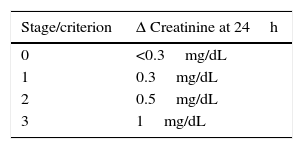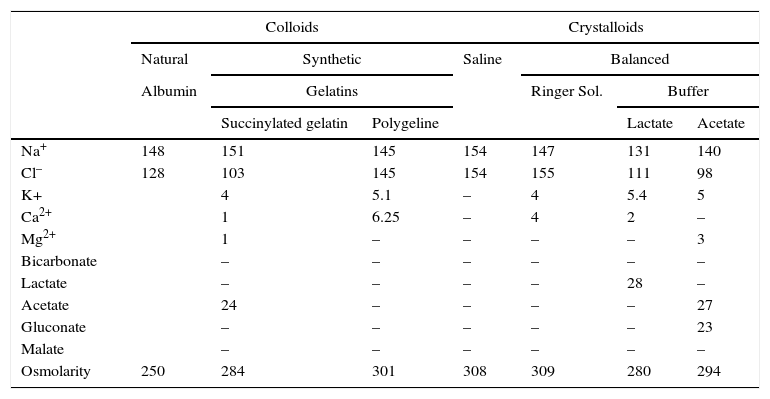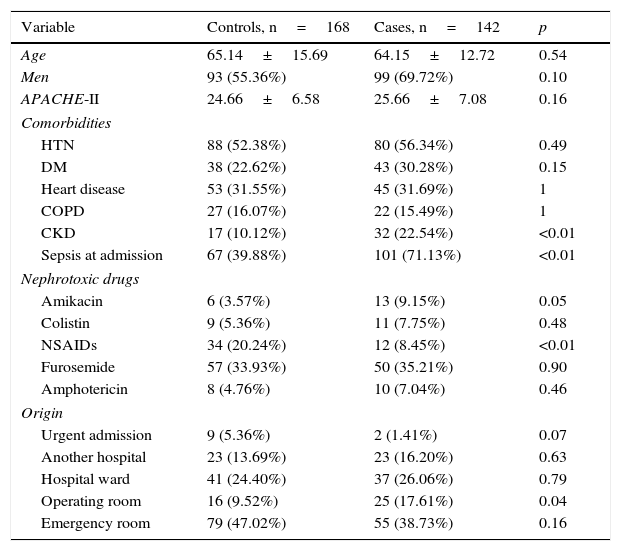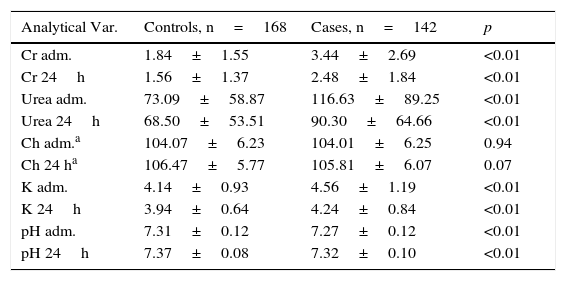To analyse the association between water balance during the first 24h of admission to ICU and the variables related to chloride levels (chloride loading, type of fluid administered, hyperchloraemia), with the development of acute kidney injury renal replacement therapy (AKI-RRT) during patients’ admission to ICU.
Patients and methodsMulticentre case–control study. Hospital-based, national, carried out in 6 ICUs. Cases were patients older than 18 years who developed an AKI-RRT. Controls were patients older than 18 years admitted to the same institutions during the study period, who did not develop AKI-RRT during ICU admission. Pairing was done by APACHE-II. An analysis of unconditional logistic regression adjusted for age, sex, APACHE-II and water balance (in evaluating the type of fluid).
ResultsWe analysed the variables of 430 patients: 215 cases and 215 controls. An increase of 10% of the possibility of developing AKI-RRT per 500mL of positive water balance was evident (OR: 1.09 [95% CI: 1.05–1.14]; p<0.001). The study of mean values of chloride load administered did not show differences between the group of cases and controls (299.35±254.91 vs. 301.67±234.63; p=0.92).
ConclusionsThe water balance in the first 24h of ICU admission relates to the development of IRA-TRR, regardless of chloraemia.
Analizar la asociación entre el balance hídrico durante las primeras 24h de ingreso en UCI y las variables relacionadas con los valores de cloro (carga de cloro, tipo de fluido administrado, hipercloremia), con el empleo de técnicas de reemplazo renal secundarias a insuficiencia renal aguda (IRA-TRR) durante el posterior ingreso en UCI de los enfermos.
Pacientes y métodosEstudio multicéntrico de casos y controles, de base hospitalaria y ámbito nacional, llevado a cabo en 6 UCI. Los casos fueron pacientes mayores de 18 años que desarrollaron una IRA-TRR. Los controles fueron pacientes mayores de 18 años, ingresados en el mismo periodo y centro que los casos, que no desarrollaron IRA-TRR durante su ingreso en UCI. Se realizó emparejamiento por APACHE-II. Se llevó a cabo un análisis de regresión logística no condicional ajustada por edad, sexo, APACHE-II. Las variables de interés principales fueron: balance hídrico, carga de cloro administrada, e IRA-TRR.
ResultadosSe han analizado las variables de 310 enfermos. Se evidenció un aumento del 10% en la posibilidad de desarrollar IRA-TRR por cada 500mL de balance hídrico positivo (OR: 1,09 [IC 95%:1,05–1,14]; p<0,001). El estudio de los valores medios de carga administrada no evidenció diferencias entre el grupo de casos y de controles (299,35±254,91 frente a 301,67±234,63; p=0,92).
ConclusionesEl balance hídrico en las primeras 24h de ingreso en UCI se relaciona con el desarrollo de IRA-TRR, independientemente de la cloremia.










